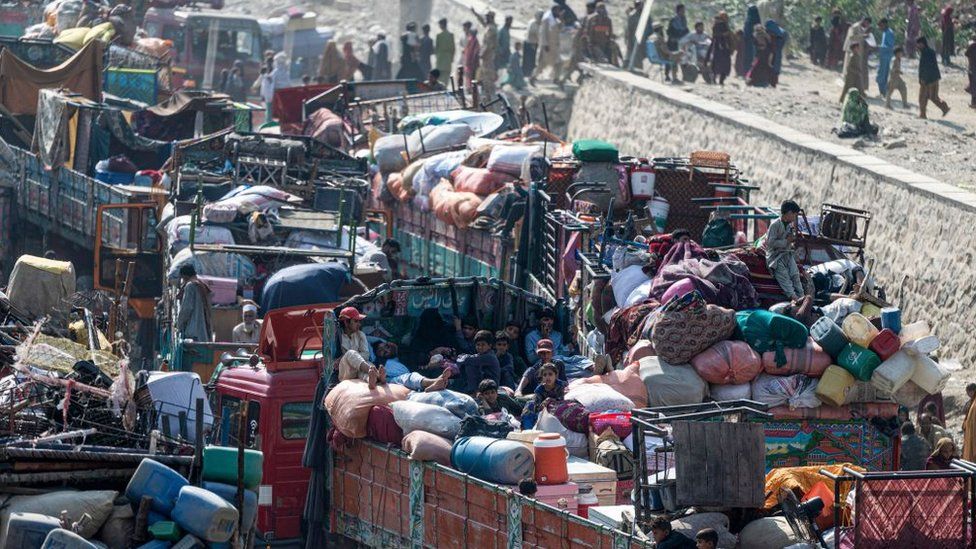
by Shaimin Raja 23 November 2023
The prevailing situation in Pakistan concerning Afghan refugees demands a meticulous examination to unravel the intricacies of this multifaceted issue. With the Afghan national population in Pakistan surging to 3.7 million, it is imperative to conduct a critical analysis of policy shifts, demographic statistics, and the underlying motives behind recent decisions. This opinion piece aims to offer a nuanced perspective on Pakistan’s evolving stance towards Afghan refugees, with a particular focus on the recent controversial decision to expel 1.7 million Afghan nationals lacking proper documentation.
Pakistan’s historical tradition of extending hospitality to refugees, particularly from Afghanistan, has garnered international commendation. Over the years, the country has opened its doors to millions fleeing the ravages of conflict and instability in Afghanistan. However, the recent move to expel a substantial segment of the Afghan population suggests a departure from this long-standing tradition, driven by the economic and security challenges posed by hosting a large number of undocumented immigrants.
A critical aspect of this issue revolves around the nuanced distinction between legal refugees and illegal immigrants. The government’s decision to target individuals lacking Proof of Registration (PoR) or the Afghanistan Citizen Card (ACC) signifies a measured response. The issuance of the ACC to approximately 880,000 refugees underscore an attempt to regularize their status, recognizing the enduring ties between Pakistan and Afghanistan.
It is crucial to dispel the narrative that Pakistan’s decision is exclusively aimed at Afghan citizens. Instead, it is a measured response to the broader challenge of managing illegal immigrants from any nationality. This aligns with international norms, underscoring Pakistan’s commitment to lawful migration processes. The clarification that the decision is not against Afghans or Pashtuns but rather against illegal immigrants dispels misconceptions surrounding the government’s intentions.
Contrary to speculative interpretations, Pakistan maintains that its national policy on Afghan refugees remains unchanged. The decision is framed as a response to economic and security challenges rather than a targeted effort against Afghan refugees. Emphasis is placed on the need for repatriation, supported by reports of improved economic and security conditions in Afghanistan, making the return of Afghan citizens a plausible and ethical choice.
Acknowledging the strain on its resources, Pakistan asserts its right to send illegal immigrants back to their country, aligning its practices with global norms. The prolonged hosting of a large refugee population without legal status has created opportunities for illegal activities and security risks, posing a threat to Pakistani citizens. Intelligence reports supporting the claim that Afghan nationals have contributed to security issues further justify the decision.
Despite over four decades of generosity, Pakistan argues that the International Afghan Government (IAG) has not reciprocated in preserving goodwill. The policy of phased and time-bound repatriation is positioned as a pragmatic approach, balancing the humanitarian legacy with current security imperatives.
Highlighting that the deportation of aliens by host countries is a global norm, Pakistan situates its decision in a broader international context. Examples of other nations, including Iran, Turkey, the US, and India, deporting Afghan refugees in 2023, position Pakistan as part of a collective international practice. Maintaining diplomatic engagement with Afghan authorities, Pakistan expresses its commitment to bilateral cooperation, particularly in facilitating the safe return of illegal Afghan immigrants.
In conclusion, Pakistan’s approach to Afghan refugees represents a delicate balance between its humanitarian legacy and current security challenges. The decision to expel a specific segment of the Afghan population is rooted in the need to address economic constraints, security threats, and adherence to international norms. It is imperative to consider these nuanced factors while evaluating the evolving dynamics of the Afghan refugee situation in Pakistan. As the geopolitical landscape continues to shift, finding a sustainable solution that respects humanitarian principles while safeguarding national interests remains a complex yet essential task for all stakeholders involved.
